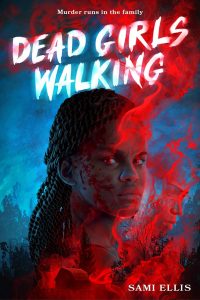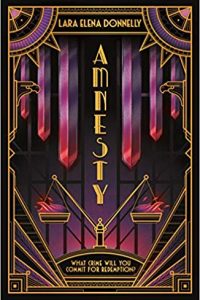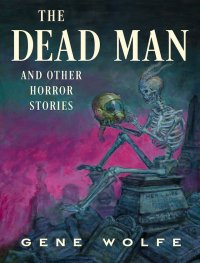Alex Brown Reviews Dead Girls Walking by Sami Ellis
 Dead Girls Walking, Sami Ellis (Amulet Books 978-1-41976-676-3, $19.99, 368pp, hc) March 2024.
Dead Girls Walking, Sami Ellis (Amulet Books 978-1-41976-676-3, $19.99, 368pp, hc) March 2024.
Serial killing runs in the family in Dead Girls Walking, Sami Ellis’s debut young adult horror novel. Several years ago, Thomas Baker was arrested, his reign of terror finally ended. He confessed to kidnapping, torturing, branding, and murdering more than a dozen people, burying their bodies on his sprawling farm. Temple grew up surrounded by death. Her mother, seemingly terrified of her husband, disappeared when Temple was little. Now rotting away in prison, Thomas tells Temple he murdered her mother and hid her body somewhere on the property. Despite not believing him and despite all the pain and suffering he caused her and others, she agrees to return to the abandoned Baker farm, if for no other reason than to prove he’s lying.
Temple lies her way into a position as a counselor in training at a horror-themed camp for queer BIPOC teens that happens to take place not far from her old home. The camp is connected to a reclusive local author who wrote a cult classic horror novel the girls are obsessed with. Her plan is to use the camp as cover for sneaking back home and finding out what really happened to her mother. After years of being harassed and bullied by locals and true crime fanatics, Temple is angry and isolated. She rejects all attempts at friendship and immediately goes on the attack. She tells herself over and over again that she doesn’t care about the girls at the camp, but the more she protests, the harder it is to believe. Especially once the bodies start piling up.
Someone or something is picking off the campers. At first Temple suspects a copycat killer, but what she finds instead is so much worse. Whatever is going on, the Bakers are at the heart of it, as is that mysterious horror novel, which may be more fact than fiction. Temple’s family started this, and she’s the one who has to end it.
Temple is, at first, a deeply unlikeable character. That’s intentional on Temple’s part. With her chaotic childhood and the bullying she’s suffered since her father’s arrest, she has every reason to be closed off and off-putting. The girls at the camp also don’t make much of an effort to endear themselves to her, not at first anyway. Some readers struggle with unlikeable protagonists, but I find them so compelling. I don’t need to like my main characters in order to want to spend time with them. Temple’s character development and emotional growth is less dramatic than the plot suggests, but it’s satisfying and felt realistic.
Ellis plays with a lot of horror tropes, some with greater success than others. Sometimes the tropes get in the way of the story. There’s a lot going on in Dead Girls Walking. So much that at times it’s hard to keep track of what’s going on and who’s still alive. In the last quarter or so, Ellis piles twist after twist after twist, reveal after reveal after reveal. At times it felt like three different stories stitched into one rather than a cohesive story. I understand the narrative and structural reasons for everything, but it makes for a rather hectic reading experience.
The trope she knocks out of the park is the Final Girl. Traditionally, the Final Girl is the last surviving person in a slasher movie. She’s the good girl, the one who doesn’t drink, smoke, have sex, or engage in other behaviors or activities that would call into question her morality or integrity. Often, the Final Girl kills the Big Bad herself, although sometimes a heroic man steps in to save the day. Think Sidney Prescott from Scream, Laurie Strode from Halloween, or Alice Hardy from Friday the 13th. Stephen Graham Jones brilliantly deconstructs the Final Girl trope with Jade Daniels and the Indian Lake Trilogy, as does Ellis with Dead Girls Walking. I can’t get into details without spoiling the ending, but I loved it. What I will say is that the Final Girl is rarely a person of color, rarely queer, and even more rarely both at the same time, so kudos to Ellis for turning the whole thing on its head.
Alex Brown is a librarian, author, historian, and Hugo-nominated and Ignyte award-winning critic who writes about speculative fiction, young adult fiction, librarianship, and Black history.
This review and more like it in the April 2024 issue of Locus.
 While you are here, please take a moment to support Locus with a one-time or recurring donation. We rely on reader donations to keep the magazine and site going, and would like to keep the site paywall free, but WE NEED YOUR FINANCIAL SUPPORT to continue quality coverage of the science fiction and fantasy field.
While you are here, please take a moment to support Locus with a one-time or recurring donation. We rely on reader donations to keep the magazine and site going, and would like to keep the site paywall free, but WE NEED YOUR FINANCIAL SUPPORT to continue quality coverage of the science fiction and fantasy field.
©Locus Magazine. Copyrighted material may not be republished without permission of LSFF.







